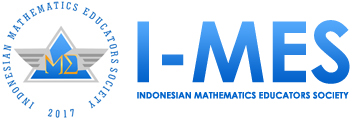PROBLEM SOLVING ON INTEGRAL CALCULUS WITH THE ASSISTANCE OF LECTURERS TUTORS, GOOGLE SEARCH, AND ARTIFICIAL INTELLEGANCE TUTORS: PHENOMENOLOGY STUDY ON PROSPECTIVE MATHEMATICS TEACHER
Abstract
This study reveals how prospective teacher students solve Integral Calculus problems with three different assistances, namely the Assistance of Lecturer Tutors, Google Search Tutors, and Artificial Intelligent (AI) Tutors through Socratic Application. This study used a qualitative approach with phenomenological methods to reveal participants' learning experiences. Research participants consisted of nine people who were divided into three groups with different assistance. The data obtained were in the form of recorded discussions, interviews, recorded cellphone screens, and artifacts of student answers. All data is analyzed based on the activity of the respondents in seeking and finding answers. The research findings show that students who study with the help of lecturer tutors are more careful in proposing assistance from the search and sorting of answers stage. While students who use AI and Google Search have almost the same characteristics in starting a search, but at the stage of sorting answers, AI is thought as able to provide more efficient and accurate recommendations answers.
Full Text:
PDFReferences
Bowden, J. a, & Green, P. (2005). Doing developmental phenomenography. Qualitative research methods, vii 183.
Hidayah, N., Danial, D., & Takdir, T. (2021). Diagnostik Kesulitan Belajar Mahasiswa Pada Mata Kuliah Kalkulus Program Studi Tadris Matematika IAIM Sinjai. JTMT: Journal Tadris Matematika, 2(2), 31–39.
Jaworski, B. (2002). Sensitivity and Challenge in University Mathematics Tutorial Teaching. Educational Studies in Mathematics, 51(1/2), 71–94.
Khosrawi-Rad, B., Rinn, H., Schlimbach, R., & Gebbing, P. (2022). Conversational Agents in Education – A Systematic Literature Review. Conference: European Conference on Information Systems, (May).
Langdridge, D. (2007). Phenomenological psychology: Theory, Research and Method. In Pearson Education Limited.
Moliner, L., & Alegre, F. (2022). Attitudes, beliefs and knowledge of mathematics teachers regarding peer tutoring. European Journal of Teacher Education, 45(1), 93–112.
Monariska, E.-. (2019). Analisis kesulitan belajar mahasiswa pada materi integral. Jurnal Analisa, 5(1), 9–19.
Panjaitan, A. C. (2019). Peranan Representasi Berbantuan Software Maple Pada Pembelajaran Mata Kuliah Kalkulus. MES: Journal of Mathematics Education and Science, 4(2), 132–138.
Roscoe, R. D., & Chi, M. T. H. (2007). Understanding tutor learning: Knowledge-building and knowledge-telling in peer tutors’ explanations and questions. Review of Educational Research, 77(4), 534–574.
Routledge Falmer. (2003). Qualitative educational research in action: Doing and reflecting. In Qualitative Educational Research in Action: Doing and Reflecting.
Sallah, E. K., Sogli, J. K., Owusu, A., & Edekor, L. K. (2021). Effective Application of Maple Software to Reduce Student Teachers’ Errors In Integral Calculus. African Journal of Mathematics and Statistics Studies, 4(3), 64–78.
Salleh, T. S. A. @, & Zakaria, E. (2013). Enhancing Students’ Understanding in Integral Calculus through the Integration of Maple in Learning. Procedia - Social and Behavioral Sciences, 102(Ifee 2012), 204–211.
Saparwadi, L. (2015). Peningkatan Kualitas Pembelajaran Kalkulus Integral Melalui Kegiatan Lesson Sudy Di Program Studi Pendidikan Matematika. Jurnal Pendidikan Matematika, 9(1), 35–48.
Shodikin, A., & Novianti, A. (2017). Design of Animated Subject Materials in Integral Calculus CourseRancang Bangun Bahan Ajar Animasi Kalkulus Integral. Unnes Journal of Mathematics Education, 6(3), 294–298.
Soesanto, R., Bermuli, J., & Mumu, B. (2022). Implementation of Blended Learning Models during the Pandemic. EDUTEC : Journal of Education And Technology, 5(4), 875–886.
Susilo, B. E., Darhim, D., & Prabawanto, S. (2019). Students Critical Thinking Skills Toward Concepts Differences In Finding Area Of A Plane Region And Definite Integral. Unnes Journal of Mathematics Education, 8(1), 1–7.
Susilo, B. E., Mashuri, Winarti, E. R., & Soedjoko, E. (2022). Analisis Kesulitan Belajar Kalkulus, Reduksi, Dan Strateginya Sebagai Upaya Konstruksi Kemampuan Berpikir Kritis Mahasiswa Calon Guru. Konservasi Pendidikan Jilid 2, 163–194.
Wellnhammer, N., Dolata, M., Steigler, S., & Schwabe, G. (2020). Studying with the Help of Digital Tutors: Design Aspects of Conversational Agents that Influence the Learning Process. Proceedings of the Annual Hawaii International Conference on System Sciences, 2020-Janua, 146–155.
Yaman, B. B. (2019). A multiple case study: What Happens in Peer Tutoring Of Calculus Studies? International Journal of Education in Mathematics, Science and Technology, 7(1), 53–72.
Yulianto, E., Santika, S., Arumsari, C., & Turmudi. (2019). Trends for ‘wiskunde’ or ‘wiskunst’? the case of students’ problem solving on elementary math problem (a little practical review from ‘revisiting mathematics education’). IOP Conf. Series: Journal of Physics: Conf. Series 1315. DOI:10.1088/1742-6596/1315/1/012038
DOI: https://doi.org/10.37058/jarme.v5i2.7947
Refbacks
- There are currently no refbacks.

This work is licensed under a Creative Commons Attribution-ShareAlike 4.0 International License.
Jurnal Penelitian Otentik Pendidikan Matematika (JARME)
Program Studi Pendidikan Matematika Universitas Siliwangi
Jl. Siliwangi no. 24 Kota Tasikmalaya - 46115
email: jarme@unsil.ac.id
e-ISSN: 2655-7762
Dilisensikan di bawah Lisensi Creative Commons Attribution 4.0 International
StatCounter: Detail
Diindeks oleh :


.jpg)
.jpg)



